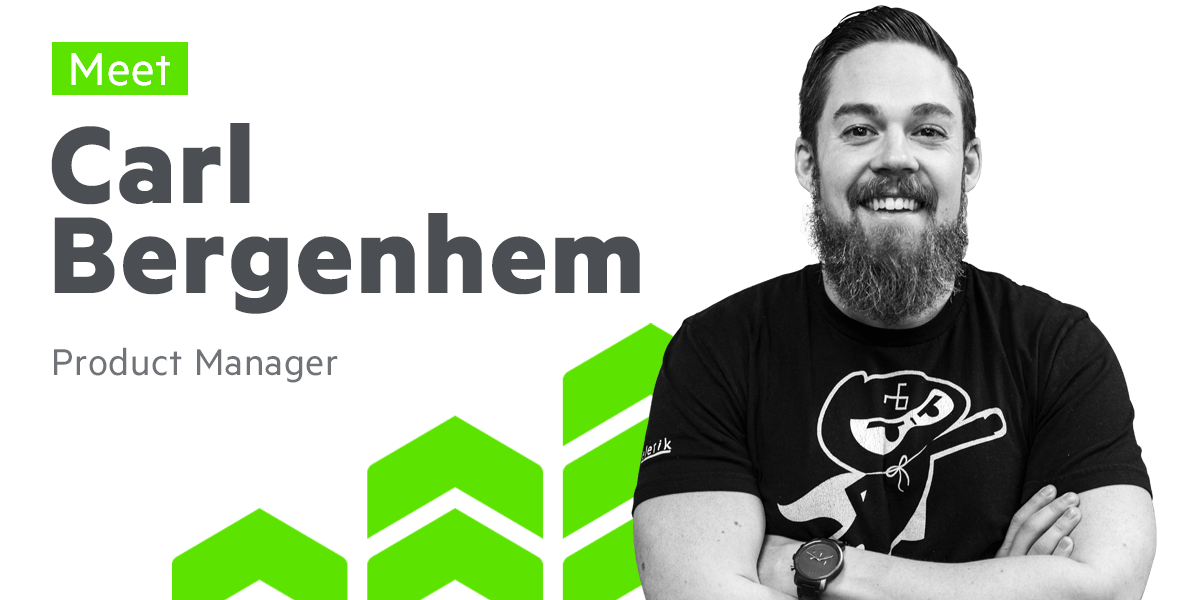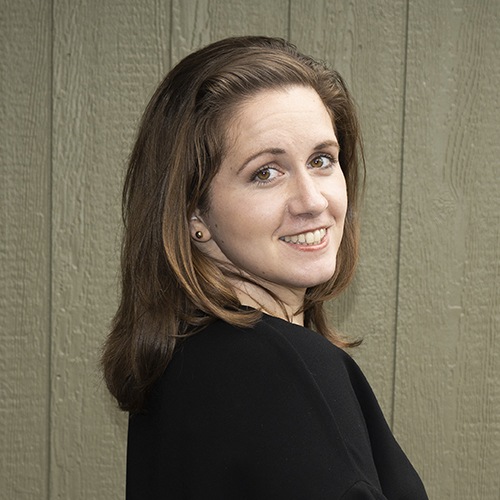Meet Carl Bergenhem, Product Manager at Progress

We’d like to introduce you to some of the people from around the world who make us who we are. In this post, meet Carl Bergenhem, the product manager for all Kendo UI products.
Originally from Sweden, Carl loves video games, board games, rock music (and metal!) and he’s been with the company for 11 years.
If you had to explain to a 5-year-old what you do at Progress, how would you describe it?
Whenever I talk to anyone about what I do at Progress I always bring up an analogy to Legos, and I certainly thinks that it works for someone who is 5 years old as well. At Progress, my team builds Lego pieces for developers, who are the people that build Lego creations. Developers get asked, “I want a castle,” or “I want a spaceship,” and they come to us for all the different pieces. So, my team designs and creates the different Lego pieces (rectangles, pieces that can bend, etc.) that developers then use to build whatever Lego creations that they are asked to build.
What I do is talk to all these developers and ask them what kind of pieces they need. Are they happy with the type of pieces they can get from us, or do they need new types of pieces? Do they just need new colors on old pieces? Once I get a good idea of what they need to build their masterpieces, I go to my team and ask them to create the new pieces to make sure our customers can build what they want.
Because we talk to so many different people we sometimes invent brand new pieces to see if they can help people as well. My job is to make sure that we build the right pieces and at the right time so all of our customers can build whatever Lego creations that they want to build.
What’s your favorite thing about being a product manager at Progress?
There’s a lot of fun things I can pull from, but my favorite thing is hearing positive feedback from customers and seeing our products being used in the wild. Whenever I hear of someone being successful or see the products being used in applications it always gives me a warm and fuzzy feeling.
It’s one thing to build something for the sake of building it, but to hear that someone is actively using our products and they have achieved success through using them is the ultimate validation that you’re doing something right.
What has your career path looked like at Progress? Where did you start and how did you become a product manager?
I initially started my career as a developer support specialist at Telerik. My day-to-day involved answering support tickets, forum threads and being available to help any technical questions that was asked by the sales team. At this point, I covered everything within the Telerik portfolio, including desktop and web technologies, which started to include Telerik UI for ASP.NET MVC just a few months after I came on board.
As Telerik grew, I started getting more and more involved on assisting on both the sales sides, as well a developer advocacy. I ended up starting the sales engineering team, which continued the technical coverage of products, but specifically to help with technical questions coming through sales, hosting webinars and presentations.
Often times, I was being the face that people associated with the products because I ended up having a lot of one-on-ones with developers at their desks, stepping through any issues or pieces of feedback that they may have. This also involved a lot of proof of concept and application development, although just at a small scale, to give potential customers an idea of what they can achieve with our products. During this time, we distributed the product knowledge among different sales engineers, and I mainly focused on Kendo UI and everything web related as web development is my true passion.
While it was not working on the product team, working on the sales engineering side of things required me to have an in-depth knowledge of the products. It also gave me a view in to how product managers dealt with feedback and planning the roadmap as I was often brought in to planning meetings and worked very closely with the product team to provide any and all feedback that I received while talking to customers.
The transition to full time product manager for Kendo UI came when the position was about to open up. From working closely with the product team I felt like this could be a good fit, so I started studying up on the product management role by reading several books (recommended by other product managers and our VP of product) and the more I read the more I knew this was something I wanted to do.
So, I threw my hat in to the ring, presented my plan for Kendo UI over the next couple of releases as well as beyond the next year, and three years later I’ve been going strong as the product manager for all Kendo UI products.
In what way did Progress support you in growing as a person and a professional?
In all honesty, Progress is where I started my professional career. I started at Telerik, since acquired by Progress, right out of college and have been with the company ever since. Throughout my almost 11-year tenure with the company, I have been supported in every role change and evolution of a role that I have wanted to pursue. I even created a role that previously did not exist for our division. The last transition, becoming a product manager for one of the core products for our business, was all possible thanks to the support network that I had within the company—both within the team I am currently a member of as well as people in other roles within the company that were just super supportive.
On the personal side, there has been a lot of growth as well. Joining the company fresh out of college certainly meant a lot of growing was going to be done no matter what, but I certainly consider that a big portion of who I am today is thanks to the influence from the growth that I have done at Progress.
What made you want to work in the tech industry?
One of my favorite hobbies is video games. Ever since my parents taught me how to load a cassette to play games on a Sinclair ZX Spectrum I was hooked. Growing up I would play all these games and wonder just how to make something just like it on my own and a dream of mine was to create video games professionally.
As a part of this I was naturally drawn to programming and dabbled in various programming languages like Basic doing nothing serious, just silly little text-based games or calculators.
Then, I discovered the world wide web and just spent hours inspecting HTML of other web pages and felt like a superstar when I could copy and paste some code, tweak it to make it my own, and have it up and running on my machine. I fell in love with the web as a platform and knew that I wanted to do something with the web. Plus, I started to hear about the grueling schedule of the gaming industry and figured it would be better to be on the consumer side of things.
What activities do you enjoy the most once the working day is over?
Most of my time outside of work is spent either playing some sort of video game, playing board games, listening to rock ‘n’ roll or metal (on vinyl, of course 😉), or some sort of physical activity. I always get some sort of workout in during the day because many of my hobbies involve sitting in the same chair that I work in, and if I’m not at home you can usually find me in my local gym or hitting the slopes and snowboarding (season permitting of course).
How do you balance your work, social activities and personal life?
Earlier in my career there probably wasn’t that much balance honestly, but I’ve slowly built up the muscle to ensure that I can have a better balancing act between them.
Generally, I set rules for myself the day before in terms of when I will start and end work. Giving myself a finite range helps ensure that once that “end” time happens I put down work (at least for a little) and do something outside of work.
Some days may be longer, and some may be shorter, but this at least lets me plan things like social activities or personal life items around work for that day. I think that it is very easy to have time fly away from you when you do not set some sort of boundary, and work is certainly no exception. Now, there may be some extra work that needs to be done in a day even after my designated “end” time, but this is generally made up after my social and personal activities (time permitting—I always need a good night’s sleep) or it goes into the plan for next day, extending the workday a bit by waking up earlier if need be.
What’s one fact about yourself that surprises people?
The fact that I’m originally from Sweden and that I speak Swedish fluently. My Swedish accent has disappeared since a while back and so it usually surprises people when I mention it or switch over to Swedish whenever I hear someone speaking it around me.

Danielle Sutherby
Danielle Sutherby is a marketing communications manager at Progress, where she supports Progress’ employer brand efforts, raises awareness of the company’s corporate social responsibility (CSR) and inclusion and diversity (I&D) efforts, assists in PR activities, and strategizes employee engagement activities worldwide. Danielle is also the co-founder of the first employee resource group at Progress, Progress for Her, which aims to empower women at the company by providing leadership and networking opportunities. When she is not at work, you can find her writing, reading, or acting like a tourist in her own city.
